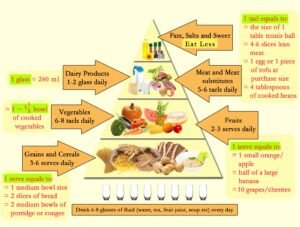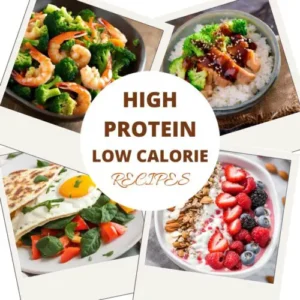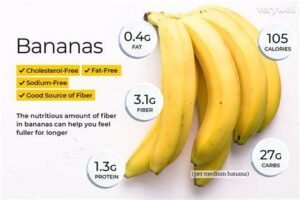Unlocking the Secrets of Your Body’s Powerhouse
Nutrition is like the fuel that powers your body in the nutritional world. It’s all about giving your body the right stuff to function at its best.
Think of your body as a high-performance car. If you put low-quality fuel in it, it’s going to sputter and break down. But if you give it premium fuel, it’s going to run smoothly and efficiently in this nutritional world.
Dive into the Nutritional World
Today, we’re going to take a deep dive into the fascinating nutritional world. We’ll uncover some mind-blowing facts that will change the way you think about food.
Get ready to discover how the foods you eat can impact everything from your energy levels to your mood.
So, buckle up and get ready for a wild ride through the nutritional world. Let’s explore together!
Click to see
Fact 1 – Macronutrients 101 : Unlocking the Power of Food
Macronutrients are the building blocks of our diet. These include carbohydrates, proteins, and fats. They provide the energy our bodies need to function.
The Truth About Carbs: Your Body’s Fuel
Let’s clear up one of the biggest nutrition myths out there: carbs are not the enemy! In fact, they’re your body’s primary source of energy.
Think of them as the fuel that powers your brain, muscles, and organs, helping you stay energized throughout the day.

variety of whole grains, fruits, and vegetables
But not all carbs are created equal. There are two main types:
- Complex carbs: These are the good guys! Found in whole grains, fruits, and vegetables, they’re packed with fiber and nutrients. Complex carbs provide a steady release of energy, keeping you feeling full and satisfied.
- Simple carbs: These are the ones to watch out for. Found in sugary drinks, white bread, and processed snacks, they offer a quick energy boost but can lead to blood sugar spikes and crashes.
So, the key is to focus on complex carbs and limit your intake of simple carbs.
Now, Let,s talk about Protein
It’s the building block of your body, essential for muscle repair and growth, hormone production, and a strong immune system.

plate with grilled chicken, brown rice, and broccoli
Protein-rich foods include lean meats, poultry, fish, eggs, beans, lentils, tofu, and Greek yogurt. Aim to include a source of protein in every meal to support your overall health and well-being.
Finally, let’s address Fats
While often demonized, healthy fats are crucial for your body. They help absorb vitamins, protect your organs, and keep you feeling satisfied.

handful of almonds and avocado
Focus on unsaturated fats found in olive oil, avocados, nuts, and seeds. These fats are heart-healthy and can help lower bad cholesterol.
Limit saturated and trans fats found in red meat, full-fat dairy, and processed foods.
By understanding the roles of carbs, proteins, and fats, you can create a balanced diet that supports your overall health and well-being.
Fact 2 – Micronutrients: Tiny but Mighty
While macronutrients like carbs, proteins, and fats provide the bulk of your daily energy, it’s the micronutrients that truly pack a punch.
These essential vitamins and minerals are found in smaller amounts but play a vital role in almost every function of your body.

plate with colorful fruits, vegetables, and nuts
From boosting your immune system to strengthening your bones, micronutrients are the unsung heroes of your health. For example, vitamin C helps repair tissues, iron carries oxygen to your cells, and calcium builds strong bones.
Micronutrients and Chronic Disease
Interestingly, research shows a strong link between micronutrient deficiencies and chronic diseases like heart disease, diabetes, and cancer. That’s why it’s crucial to get a variety of nutrient-rich foods in your diet.
People often ask: What is the most important nutrient?
The truth is, all nutrients are important. Your body needs a balance of vitamins and minerals to function optimally. Instead of focusing on a single nutrient, aim for a diverse diet filled with colorful fruits, vegetables, whole grains, lean proteins, and healthy fats.
Fact 3 – Your Gut: A Second Brain
Your gut isn’t just about digestion; it’s a complex ecosystem housing trillions of bacteria collectively known as the gut microbiome.
This intricate community plays a crucial role in overall health, and recent research has unveiled a fascinating connection between your gut and brain.

human digestive system with a closeup of gut bacteria
The gut-brain axis is a two-way communication system. Your gut sends signals to your brain, influencing mood, appetite, and even cognitive function.
In return, your brain can impact digestion and gut health. This connection highlights the importance of nurturing your gut microbiome.
Nourishing Your Gut: Probiotics and Prebiotics
Two key players in gut health are probiotics and prebiotics.
- Probiotics are live bacteria that offer health benefits. Found in yogurt, kefir, and fermented foods, they help balance the gut microbiome.
- Prebiotics are types of fiber that act as food for beneficial gut bacteria. They’re abundant in garlic, onions, bananas, and whole grains.
By consuming a diet rich in probiotics and prebiotics, you can support a healthy gut environment.
Tips for a Healthier Gut
- Prioritize fiber: Include plenty of fruits, vegetables, and whole grains in your diet.
- Limit processed foods: These can disrupt the gut microbiome.
- Manage stress: Chronic stress can negatively impact gut health.
- Consider probiotics: Incorporate probiotic-rich foods or supplements into your routine.
- Get enough sleep: Sleep deprivation can affect gut bacteria.
People often ask: How true are nutrition facts?
While many nutrition facts are backed by scientific evidence, it’s essential to be a critical consumer. Look for credible sources, and remember that individual needs vary.
Fact 4 – The Hidden Dangers of Processed Foods
Processed foods are everywhere, from the grocery store shelves to vending machines. While convenient, they often come with hidden costs to your health.
The processing of foods strips away essential nutrients and adds unhealthy ingredients like excessive sodium, unhealthy fats, and added sugars.
These factors contribute to various health issues, including obesity, heart disease, and type 2 diabetes.

comparison between a whole food and a processed version
Furthermore, the rise of food additives is a growing concern. These substances are added to enhance flavor, color, texture, or shelf life.
Some additives have been linked to health problems, although more research is needed to determine their long-term effects.
Healthy Alternatives to Processed Foods
To reduce your intake of processed foods, focus on whole, unprocessed ingredients. Here are some tips:
- Cook at home: Prepare meals using fresh or frozen produce, whole grains, and lean proteins.
- Read food labels: Be aware of hidden additives and excessive sodium, sugar, and unhealthy fats.
- Snack smart: Choose fruits, vegetables, nuts, and seeds over processed snacks.
People often ask: What are some mind-blowing facts about food?
One mind-blowing fact is that the average American consumes about 150 pounds of added sugar per year. Another surprising fact is that the gut bacteria of obese individuals differ significantly from those with a healthy weight.
Fact 5 – Nutrition and Weight Management
Achieving and maintaining a healthy weight is a complex interplay of various factors, with nutrition playing a pivotal role. Let’s delve into the science behind weight management.
Metabolism and Hormones: The Weight Loss Equation
Metabolism is your body’s process of converting food into energy. Hormones, such as insulin and leptin, regulate appetite, energy expenditure, and fat storage.
A well-balanced diet can support optimal hormone function and metabolism.

balanced meal on a plate
Portion Control and Mindful Eating
While calorie intake matters, so does mindful eating. Portion control helps regulate calorie consumption, while mindful eating involves paying attention to hunger cues and enjoying your food without distractions.
Fad Diets: A Critical Look
The weight loss industry is flooded with fad diets promising quick results. However, sustainable weight management is about adopting healthy habits, not quick fixes.
Many fad diets lack essential nutrients and can lead to unhealthy weight cycling.
Focus on creating a balanced diet rich in whole foods, regular physical activity, and adequate sleep for long-term weight management success.
People often ask: Is Nutrition Facts important?
Absolutely! The Nutrition Facts label provides valuable information about a food’s calorie, fat, sodium, and sugar content. Use it to make informed choices and compare products.
Fact 6 – Nourish Your Mind
Your diet isn’t just about physical health; it also significantly impacts your mental well-being. The connection between what you eat and your mood is stronger than you might think.
The Gut-Brain Connection: Food for Thought
We’ve already discussed the gut-brain axis. This powerful connection highlights how gut health influences mood, memory, and cognitive function.
Certain foods can positively impact your mental state.
Omega-3s and B Vitamins: Brain Boosters
Omega-3 fatty acids and B vitamins are essential for brain health. Found in fatty fish, walnuts, flaxseeds, and whole grains, these nutrients support mood regulation, memory, and cognitive function.
Diet for Stress Management
To cope with stress, consider incorporating these foods into your diet:
- Complex carbs: Provide sustained energy levels.
- Lean protein: Helps stabilize blood sugar.
- Magnesium-rich foods: Like spinach, almonds, and avocado, can help relax muscles.
- Vitamin C-rich foods: Boost your immune system and reduce stress hormones.
People often ask: What is a surprising fact about nutrition?
A surprising fact is that the bacteria in your gut can influence your mood and behavior. This highlights the importance of gut health for overall well-being.
Fact 7 – The Future of Food
Nutrition science is a dynamic field, constantly evolving with new discoveries and innovations. Let’s explore some exciting trends shaping the future of food.
Emerging Trends in Nutrition Science
- The microbiome: Research is delving deeper into the gut microbiome’s impact on overall health, leading to new dietary recommendations.
- Plant-based diets: With growing environmental and health concerns, plant-based diets are gaining popularity.
- Precision nutrition: Understanding individual genetic makeup and lifestyle factors to tailor nutrition plans.
Personalized Nutrition: The Future of Food
Imagine a diet customized to your unique genetic makeup and health goals. Personalized nutrition is becoming a reality, with advancements in technology and genetic testing.
This approach could revolutionize how we eat and manage health conditions.
Ethical Considerations in Food Technology
While food technology offers exciting possibilities, it also raises ethical questions. Issues like food security, sustainability, and the potential for genetically modified foods require careful consideration.
People often ask: What is one nutrition fact?
One essential nutrition fact is to prioritize whole, unprocessed foods. These provide the foundation for a healthy diet.
As the nutritional world continues to evolve, staying informed and adaptable is key to optimizing your health and well-being.
Your Nutritional World Journey Starts Here
We’ve covered a lot of ground in this nutritional exploration. From understanding the power of macronutrients to uncovering the importance of gut health and the impact of processed foods, you now have a solid foundation for making informed food choices.
Remember, every bite counts. By incorporating a variety of nutrient-rich foods into your diet, you’re investing in your overall health and well-being. Don’t forget the importance of portion control, mindful eating, and staying hydrated.
Share your nutritional journey with friends and family! Inspire others to prioritize their health by sharing this post on social media.
Want to dive deeper into the nutritional world? Check out these reliable resources:
- [Link to a reputable health organization]
- [Link to a nutritionist or dietitian’s website]
Ready to take control of your health? Start by making small, sustainable changes to your diet. Your body will thank you!
Click to see





